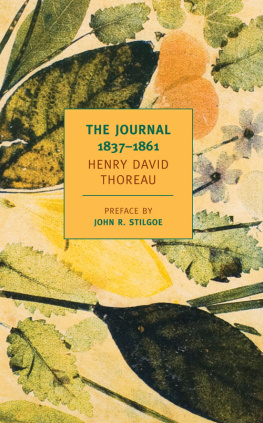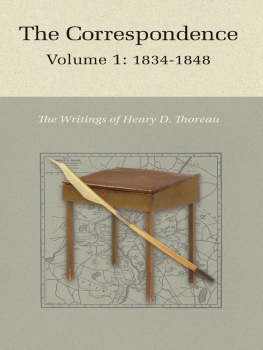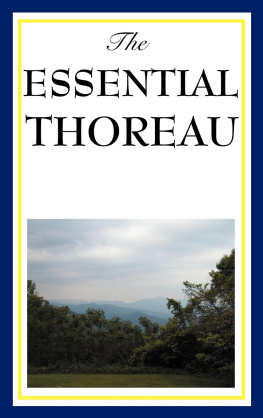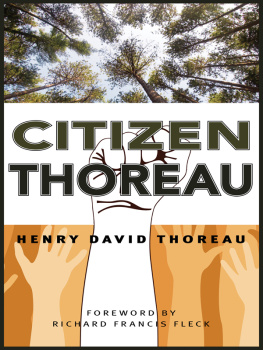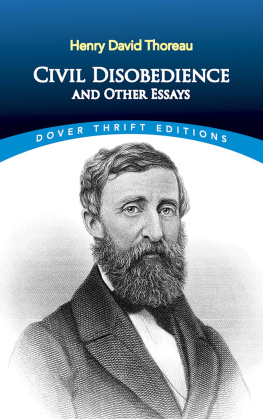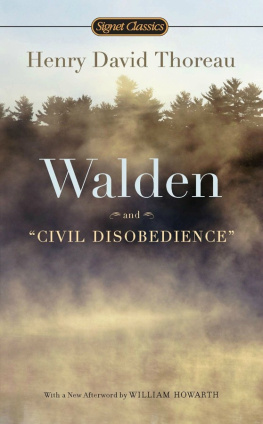Henry David Thoreau - Canoeing in the Wilderness, Walden, Walking, Civil Disobedience and More
Here you can read online Henry David Thoreau - Canoeing in the Wilderness, Walden, Walking, Civil Disobedience and More full text of the book (entire story) in english for free. Download pdf and epub, get meaning, cover and reviews about this ebook. year: 2012, genre: Science / Politics. Description of the work, (preface) as well as reviews are available. Best literature library LitArk.com created for fans of good reading and offers a wide selection of genres:
Romance novel
Science fiction
Adventure
Detective
Science
History
Home and family
Prose
Art
Politics
Computer
Non-fiction
Religion
Business
Children
Humor
Choose a favorite category and find really read worthwhile books. Enjoy immersion in the world of imagination, feel the emotions of the characters or learn something new for yourself, make an fascinating discovery.
- Book:Canoeing in the Wilderness, Walden, Walking, Civil Disobedience and More
- Author:
- Genre:
- Year:2012
- Rating:3 / 5
- Favourites:Add to favourites
- Your mark:
- 60
- 1
- 2
- 3
- 4
- 5
Canoeing in the Wilderness, Walden, Walking, Civil Disobedience and More: summary, description and annotation
We offer to read an annotation, description, summary or preface (depends on what the author of the book "Canoeing in the Wilderness, Walden, Walking, Civil Disobedience and More" wrote himself). If you haven't found the necessary information about the book — write in the comments, we will try to find it.
Henry David Thoreau: author's other books
Who wrote Canoeing in the Wilderness, Walden, Walking, Civil Disobedience and More? Find out the surname, the name of the author of the book and a list of all author's works by series.
Canoeing in the Wilderness, Walden, Walking, Civil Disobedience and More — read online for free the complete book (whole text) full work
Below is the text of the book, divided by pages. System saving the place of the last page read, allows you to conveniently read the book "Canoeing in the Wilderness, Walden, Walking, Civil Disobedience and More" online for free, without having to search again every time where you left off. Put a bookmark, and you can go to the page where you finished reading at any time.
Font size:
Interval:
Bookmark:
of Contents
1867
Henry David Thoreau
Whereer thou sailst who sailed with me,
Though now thou climbest loftier mounts,
And fairer rivers dost ascend,
Be thou my Muse, my Brother .
I am bound, I am bound, for a distant shore,
By a lonely isle, by a far Azore,
There it is, there it is, the treasure I seek,
On the barren sands of a desolate creek.
I sailed up a river with a pleasant wind,
New lands, new people, and new thoughts to find;
Many fair reaches and headlands appeared,
And many dangers were there to be feared;
But when I remember where I have been,
And the fair landscapes that I have seen,
Thou seemest the only permanent shore,
The cape never rounded, nor wandered oer.
Fluminaque obliquis cinxit declivia ripis;
Quae, diversa locis, partim sorbentur ab ipsa;
In mare perveniunt partim, campoque recepta
Liberioris aquae, pro ripis litora pulsant.
Ovid , Met. I. 39
He confined the rivers within their sloping banks,
Which in different places are part absorbed by the earth,
Part reach the sea, and being received within the plain
Of its freer waters, beat the shore for banks.
Beneath low hills, in the broad interval
Through which at will our Indian rivulet
Winds mindful still of sannup and of squaw,
Whose pipe and arrow oft the plough unburies,
Here, in pine houses, built of new-fallen trees,
Supplanters of the tribe, the farmers dwell.
Emerson .
The Musketaquid, or Grass-ground River, though probably as old as the Nile or Euphrates, did not begin to have a place in civilized history, until the fame of its grassy meadows and its fish attracted settlers out of England in 1635, when it received the other but kindred name of Concord from the first plantation on its banks, which appears to have been commenced in a spirit of peace and harmony. It will be Grass-ground River as long as grass grows and water runs here; it will be Concord River only while men lead peaceable lives on its banks. To an extinct race it was grass-ground, where they hunted and fished, and it is still perennial grass-ground to Concord farmers, who own the Great Meadows, and get the hay from year to year. One branch of it, according to the historian of Concord, for I love to quote so good authority, rises in the south part of Hopkinton, and another from a pond and a large cedar-swamp in Westborough, and flowing between Hopkinton and Southborough, through Framingham, and between Sudbury and Wayland, where it is sometimes called Sudbury River, it enters Concord at the south part of the town, and after receiving the North or Assabeth River, which has its source a little farther to the north and west, goes out at the northeast angle, and flowing between Bedford and Carlisle, and through Billerica, empties into the Merrimack at Lowell. In Concord it is, in summer, from four to fifteen feet deep, and from one hundred to three hundred feet wide, but in the spring freshets, when it overflows its banks, it is in some places nearly a mile wide. Between Sudbury and Wayland the meadows acquire their greatest breadth, and when covered with water, they form a handsome chain of shallow vernal lakes, resorted to by numerous gulls and ducks. Just above Shermans Bridge, between these towns, is the largest expanse, and when the wind blows freshly in a raw March day, heaving up the surface into dark and sober billows or regular swells, skirted as it is in the distance with alder-swamps and smoke-like maples, it looks like a smaller Lake Huron, and is very pleasant and exciting for a landsman to row or sail over. The farm-houses along the Sudbury shore, which rises gently to a considerable height, command fine water prospects at this season. The shore is more flat on the Wayland side, and this town is the greatest loser by the flood. Its farmers tell me that thousands of acres are flooded now, since the dams have been erected, where they remember to have seen the white honeysuckle or clover growing once, and they could go dry with shoes only in summer. Now there is nothing but blue-joint and sedge and cut-grass there, standing in water all the year round. For a long time, they made the most of the driest season to get their hay, working sometimes till nine oclock at night, sedulously paring with their scythes in the twilight round the hummocks left by the ice; but now it is not worth the getting when they can come at it, and they look sadly round to their wood-lots and upland as a last resource.
It is worth the while to make a voyage up this stream, if you go no farther than Sudbury, only to see how much country there is in the rear of us; great hills, and a hundred brooks, and farm-houses, and barns, and haystacks, you never saw before, and men everywhere, Sudbury, that is Southborough men, and Wayland, and Nine-Acre-Corner men, and Bound Rock, where four towns bound on a rock in the river, Lincoln, Wayland, Sudbury, Concord. Many waves are there agitated by the wind, keeping nature fresh, the spray blowing in your face, reeds and rushes waving; ducks by the hundred, all uneasy in the surf, in the raw wind, just ready to rise, and now going off with a clatter and a whistling like riggers straight for Labrador, flying against the stiff gale with reefed wings, or else circling round first, with all their paddles briskly moving, just over the surf, to reconnoitre you before they leave these parts; gulls wheeling overhead, muskrats swimming for dear life, wet and cold, with no fire to warm them by that you know of; their labored homes rising here and there like haystacks; and countless mice and moles and winged titmice along the sunny windy shore; cranberries tossed on the waves and heaving up on the beach, their little red skiffs beating about among the alders; such healthy natural tumult as proves the last day is not yet at hand. And there stand all around the alders, and birches, and oaks, and maples full of glee and sap, holding in their buds until the waters subside. You shall perhaps run aground on Cranberry Island, only some spires of last years pipe-grass above water, to show where the danger is, and get as good a freezing there as anywhere on the Northwest Coast. I never voyaged so far in all my life. You shall see men you never heard of before, whose names you dont know, going away down through the meadows with long ducking-guns, with water-tight boots wading through the fowl-meadow grass, on bleak, wintry, distant shores, with guns at half-cock, and they shall see teal, blue-winged, green-winged, shelldrakes, whistlers, black ducks, ospreys, and many other wild and noble sights before night, such as they who sit in parlors never dream of. You shall see rude and sturdy, experienced and wise men, keeping their castles, or teaming up their summers wood, or chopping alone in the woods, men fuller of talk and rare adventure in the sun and wind and rain, than a chestnut is of meat; who were out not only in 75 and 1812, but have been out every day of their lives; greater men than Homer, or Chaucer, or Shakespeare, only they never got time to say so; they never took to the way of writing. Look at their fields, and imagine what they might write, if ever they should put pen to paper. Or what have they not written on the face of the earth already, clearing, and burning, and scratching, and harrowing, and ploughing, and subsoiling, in and in, and out and out, and over and over, again and again, erasing what they had already written for want of parchment.
As yesterday and the historical ages are past, as the work of to-day is present, so some flitting perspectives, and demi-experiences of the life that is in nature are in time veritably future, or rather outside to time, perennial, young, divine, in the wind and rain which never die.
Font size:
Interval:
Bookmark:
Similar books «Canoeing in the Wilderness, Walden, Walking, Civil Disobedience and More»
Look at similar books to Canoeing in the Wilderness, Walden, Walking, Civil Disobedience and More. We have selected literature similar in name and meaning in the hope of providing readers with more options to find new, interesting, not yet read works.
Discussion, reviews of the book Canoeing in the Wilderness, Walden, Walking, Civil Disobedience and More and just readers' own opinions. Leave your comments, write what you think about the work, its meaning or the main characters. Specify what exactly you liked and what you didn't like, and why you think so.


